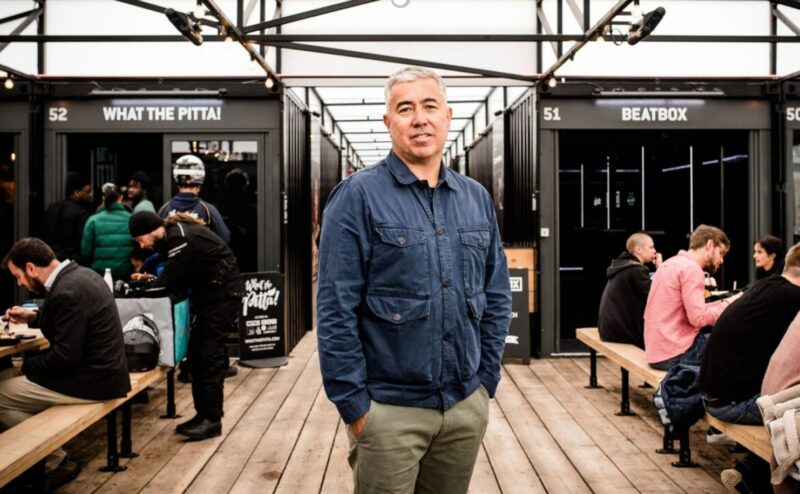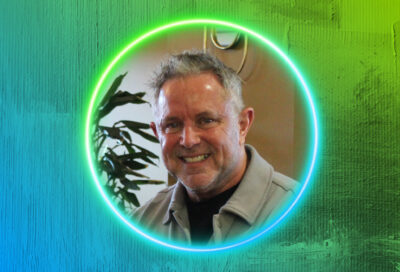Saying that Roger Wade knows how to build a business is like saying Steven Spielberg knows how to make a decent film – it’s true, but there’s a bit more to it than that. Here is an entrepreneur who’s built not one but two very cool and completely different businesses, but what is the business motivation?

First, Roger founded British streetwear brand Boxfresh in 1989 from an East London market stall. He grew it into a multi-million-pound global company with a turnover of £20m before selling it to Pentland Group in 2005. Then, five years later, Roger launched Boxpark (unrelated to Boxfresh) – a pop-up high-street made of shipping containers filled with street-food stalls, bars and shops. He and his team have now built three Boxparks – in Shoreditch, Croydon and Wembley – and in so doing have garnered a place in the Sunday Times Fast Track 100 List for three consecutive years.
Naturally, it hasn’t all been plain sailing. Five years after launch, Boxfresh was hanging by a thread – it was so ragged that Roger ended up owing his parents £250,000 (“you learn fast when you owe your parents a quarter mill,” he says). And Boxpark has been through it, too. The idea looked like a busted flush after the energy of the London Olympics dissipated in late 2012, leaving Roger’s shipping containers with a 50% occupancy rate. However, just as he did with Boxfresh (to his parents’ relief), he turned things around, shifting focus from retail to street food. Indeed, each time Roger has been on the ropes throughout his career, he’s bounced back harder. He says: “The weird thing is that the bad times were the best because that’s when I really learnt my trade. Over the years, I’ve been most successful when I’ve embraced mistakes, change and risk. By resolving issues – often errors of our own making – we’ve come up with new ideas and creative solutions, which has led to growth.”
HERE ARE ROGER’S FIVE KEY LESSONS – INSIGHTS THAT HAVE BEEN INSTRUMENTAL IN CREATING TWO PULSATING, SOARING BUSINESSES.
BE SPECIAL TO YOUR CUSTOMER; IF YOU’RE NOT, YOU WON’T EXIST.
“For me, this is the biggest lesson of them all,” says Roger. “A guy called Ted D’Cruz told me this when I was running Boxfresh in my late 20s. At the time, Ted was one of Britain’s most famous brand consultants. We’re friends now and when we reconnected, I said: ‘Ted, you know that thing you told me 30 years ago, I’ve lived my whole life by that!’ And it’s true. I spent the next three decades following that mantra, obsessing over the customer, trying to be unique to them. And doing that is even more relevant today in the internet age when all of us can access virtually any piece of information.
“To succeed, you’ve got to be focused on being remarkable. So every week – I did it this morning – I walk each of our sites and look from a customer’s perspective – right down to the detail of where a plant is positioned. Entrepreneurs I admire tend to take a similar approach – people like Nick Jones from Soho House.
“So I’m always asking myself: ‘What are the key reasons that a customer is here?’ I try to put customers first and centre. That’s the approach you have to take if you want to grow.”
TRUST YOUR INSTINCTS
“I don’t think this idea gets spoken about enough because there’s an obsession in the business world about MBAs and learning entrepreneurship from a book. Sorry guys, you can learn a lot from a book, but you’ve also got to have a good instinct, a feel for the deal.
“With Boxfresh, we launched at the beginning of the streetwear trend, and with Boxpark, we launched at the beginning of the street-food revolution. So we had the right instinct to press go at the right time.
“Rewinding to Boxfresh, it was there I learnt to trust my instincts because when I trusted them, we did better. It was when I lost my confidence and felt obliged to listen to everyone else that we weren’t successful.
“Then I came to what I considered a sleepy industry – property. I felt everyone was developing properties by numbers, to a formula. So I set out to create something new – a whole retail development built from containers. It’s so important to trust your emotional intelligence, trust your instincts and act on them.
“I have a story that sums up this idea: I used to play football with a guy called Dave Rowe – this is going back 30 years. One day, Dave said: ‘I’m going to set up an internet cafe. I don’t know where I’m going to go with it, but I just know something’s happening.’ His idea eventually became Easynet, which was sold to BSkyB for £211m. I just remember his words: ‘I don’t know where it’s going, but I know something’s happening and I’m going to go with it.’ That’s the philosophy I’m talking about: to follow your instincts, follow what you love, follow the trends. Just do it better than everyone else.”
KNOW WHY YOU ARE IN BUSINESS
“To succeed in the long term, you need to understand your ultimate business goal and recognise how and why that goal motivates you. In other words, when you ask yourself – why am I in business? – you need to be able to answer that question honestly and succinctly. If you have a dishonest or unclear view of your goal and motivation, there’s a good chance you’ll deceive yourself and plan poorly.
“So, be candid with yourself. Is ego your motivation? If so, understand that fact and take it into account. Let’s be frank, lots of people out there run businesses for egotistical reasons. To a certain extent, I did during Boxfresh when my motivation was to prove myself. But you’ve got to be careful when your ego is tied up in your business because it can get out of control.
“A purer reason to go into business is to make money, sell and exit. Your company isn’t ‘you’ but a separate entity when this is your motivation. It’s a tool to secure financial freedom for yourself and your family. Another ‘pure’ reason is to create something to hand on to your family.
“Whatever your ultimate goal is, you need to know – honestly, in your heart of hearts – why you’re becoming an entrepreneur.”
FOCUS ON BUILDING SOLID FOUNDATIONS, NOT GROWTH
“At no time have we tried to get into the Sunday Times Fast Track 100 List, so my major point here is that it’s not wise to focus on growth alone; far better to develop solid foundations. Growth can actually kill you. I remember going to London Business School 30 years ago and sitting through a course on controlling growth. I was laughing to myself, thinking, why are we learning about controlling growth; growth is great. But in hindsight, they were right. You can go bust if you grow too quickly. So, you need to make sure every aspect of your business is healthy. It’s not just about the content; it’s about getting traffic to that content. It’s not just about making sure you can finance your product, but making sure you’ve got a proper distribution policy, a proper HR policy and so on. Therefore, don’t focus on growing but on building foundations.
“I don’t hear this advice enough these days, especially from VC-funded tech companies. In fact, I’m sick of hearing about tech companies because the reality is that nine times out of ten, they’re going to go bust. Only when you’ve got a rock-solid foundation in place should you go for growth. And even then, it should be controllable growth.
“We’ve turned down opportunities to bring Boxpark to Miami, New York, LA, Bangkok and other cities because we are focused on our plan and our eventual exit.”
LEARN HOW TO BECOME A GOOD LEADER, NOT JUST A GOOD ENTREPRENEUR
“With some entrepreneurs, it’s all about them. But being a good entrepreneur doesn’t make you a good leader. They’re different skills. I didn’t recognise that for 20 years! I bought into the classic alpha male thing of ‘everything I say is right’. I was a poor leader in my first business – I had direction but didn’t bring my team with me. But with Boxpark, particularly during the past five years, I’ve focused on making myself a better leader. I’ve done personal coaching, leadership courses and some painful teamwork events where my colleagues told me precisely what they really thought of me. It was tough but good.
“Now, I think I’ve finally realised what it means to be a good leader. A good leader should set the direction, inspire people and create a good environment where employees are happy to work there. The modern-day millennial has high expectations and if you haven’t got a great working environment, they’re offski!
“After doing those things, good leadership can be quite simple. If you delegate and trust people (something I had a real problem with early on), you can simplify leadership into yes, no or maybe. That’s a good way to manage and you can run an entire company with those three words.”
A BOX OF DELIGHTS
The insights Roger shares above are a goldmine dug by an entrepreneur who’s built – by hook or crook, by trial and error and by instinct and resilience – two inspirational businesses.
His overarching message is that no matter what an entrepreneur does, their business or brand will never truly take off unless it becomes special to its customers. You achieve that by moving heaven and earth to stand out, putting your customers first, and trusting your instincts.
But that’s just for starters – you also need to know yourself and understand your motivation. Why are you going into business? What is your ultimate aim? Once you have clear, true answers to those questions and have forged a special place in your customers’ hearts, you can then focus on building strong foundations from which controllable growth can spring.
But there’s no rest for the founder: next, it’s time to transform yourself from a go-getting entrepreneur to a wise, unflappable leader. Easy, right? Well, what are you waiting for?























